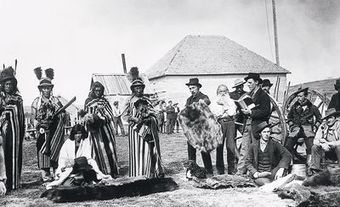
Early Life and Education
Matthew Coon Come was born in a hut on his parents’ trapline, near Mistissini in northern Quebec. At the age of six he was separated from his parents and sent to a residential school; he spent many of his early years at La Tuque Indian Residential School in central Québec, where he suffered physical and sexual abuse (see also Residential Schools in Canada).
In the 1970s he studied political science at Trent University, where he was also president of the Trent University Native Association.
Cree-Naskapi Act of 1984
Matthew Coon Come studied law at McGill University but was then asked by a delegation of Cree elders to become coordinator for the inland Cree communities during negotiations that led to the historic Cree-Naskapi Act of 1984, which made the James Bay Cree bands and the Québec Naskapi largely self-governing (see also James Bay and Northern Québec Agreement).
Chief of Mistissini First Nation
Matthew Coon Come then served two terms as chief of the Mistissini First Nation, during which time the community gained an adult education centre, new health facilities, and significant improvements to housing and community infrastructure.
Grand Chief of the Grand Council of the Crees, 1987–99
In 1987, Matthew Coon Come was elected Grand Chief of the Grand Council of the Crees and Chairman of the Cree Regional Authority. One of the most notable features of his four consecutive terms as Grand Chief was his leadership in opposing the James Bay hydroelectric megaproject. In 1988, Hydro-Québec signed a multi-billion-dollar contract with the New York Power Authority to export electricity. In order to meet this demand, Hydro-Québec planned to start the Great Whale phase of the James Bay hydroelectric project, which would have built over 30 dams and 600 dikes, blocking a number of major rivers and irreparably damaging a large portion of the James Bay region. Coon Come organized a canoe trip of elders from James Bay to New York City to demonstrate opposition to this project; the trip gained national and international attention and contributed to New York’s decision to cancel the contract in 1992; the project was officially cancelled in 1994.
Coon Come also mobilized Canadian and international support for the rights of Indigenous people in Québec, particularly the right of self-determination in relation to Québec separatism. During the 1995 Québec Referendum, Coon Come established a separate Special Referendum, in which the Cree overwhelmingly voted to stay within Canada.
National Chief of the AFN, 2000–03
In 2000, Matthew Coon Come campaigned for election as National Chief of the Assembly of First Nations, accusing the AFN of serving as a bureaucratic arm of the federal government rather than a strong advocate for Indigenous peoples. Coon Come won the election, replacing the more conciliatory Phil Fontaine. After his term ended in 2003, Coon Come became Advisor to the Grand Council of the Crees on a number of issues, including mining, renewable energy, and residential schools.
Grand Chief of the Grand Council of the Crees, 2009–17
In 2009, Matthew Coon Come was re-elected Grand Chief of the Grand Council of the Crees and Chairperson of the Cree Regional Authority. In 2012, he negotiated the historic Agreement on Governance with Québec, which gave the Cree more power and control in the James Bay region. Through this agreement, the municipality of James Bay was replaced by the Eeyou Istchee James Bay territory, a regional authority that would be governed by Cree and non-Indigenous peoples alike. This effectively gave the Cree more influence in terms of mining projects, hydroelectric developments, and wind-power schemes in the area.
In 2015, Coon Come and other activists pushed the Quebec government to establish an inquiry into racism and discrimination in Quebec public services, including policing, the judicial system and health care. This was prompted by allegations uncovered by Radio-Canada's investigative program, Enquête, that Indigenous women in Val d’Or had been abused by Quebec police officers. The Viens Commission was launched by the provincial government in 2016 and concluded in December 2018.
In June 2017, Coon Come announced that he would not seek reelection as Grand Chief. The following month, Dr. Abel Bosum was voted in as Grand Chief. Just prior to Coon Come’s departure, he signed the Agreement on Cree Nation Governance, along with Carolyn Bennett, the federal minister of Indigenous and Northern Affairs. The agreement was the result of negotiations between the federal government and the Crees of Eeyou Istchee that began in 2009. It gave the Cree the power to collect taxes and to write laws on governance issues affecting communities on Category 1A lands (that is, Cree lands under federal jurisdiction), including laws concerning land and resource use, environmental protection and public order and safety. It also moved the rules of internal governance from the Cree-Naskapi (of Quebec) Act to the Cree Constitution, which is not subject to the approval of either the Quebec or Canadian governments. In addition, the agreement guaranteed stable funding to 2040.
Other Activities
Coon Come has been chairperson or director of a number of organizations, including the Cree Nation Trust, the Cree Nation Governance Working Group, and the Eeyou Communication Network. He has promoted the rights of Indigenous people across the world and contributed to the drafting of the United Nations Declaration on the Rights of Indigenous Peoples.
Awards and Honours
- Goldman Environmental Prize (1994)
- Condé Nast Traveler Environmental Award (1994)
- National Aboriginal Achievement Award (1995)
- Honorary LLD (Trent) 1998
- Honorary LLD (Toronto) 2000
- Queen Elizabeth II Diamond Jubilee Medal (2012)
- Officer, Order of Canada (2018)

 Share on Facebook
Share on Facebook Share on X
Share on X Share by Email
Share by Email Share on Google Classroom
Share on Google Classroom

